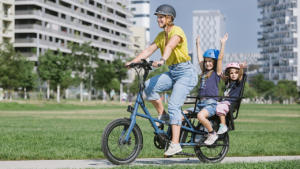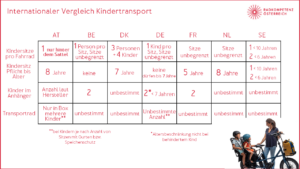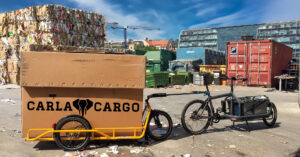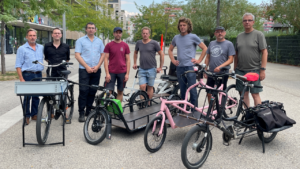The Austrian Bicycle Regulation in international comparison
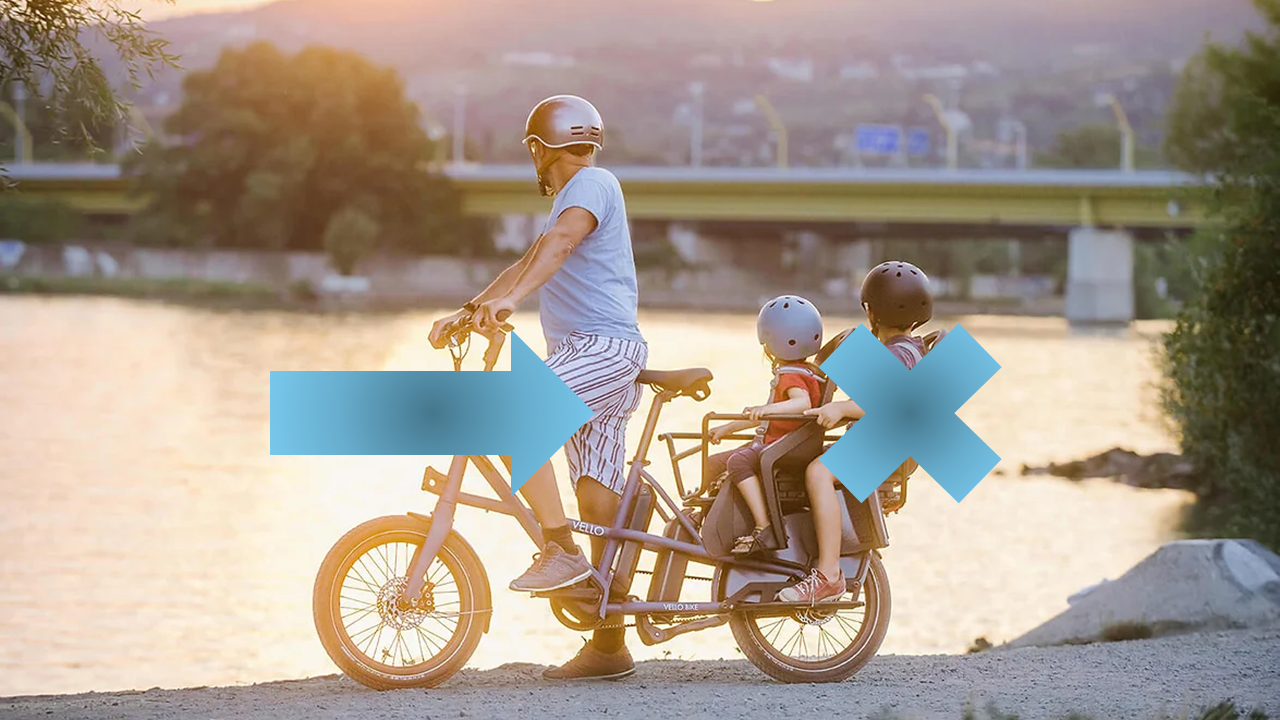
The Austrian Bicycle Regulation (FVO) supplements the StVO with detailed provisions on child transport, trailers and equipment. It is already 23 years old and requires modernization, as, among other things, the common carriage of two children on longtail transport bikes does not comply with the FVO and multi-axle trailers may not be used. Members of the Cycle Competence Platform have researched the legal situation in other EU member states, which were selected due to their high cycling mode share, established cycling culture and exemplary effect for Austria: Belgium, Denmark, Germany, France, the Netherlands and Sweden. Thanks to our membership in the Cycling Knowledge Europe network, we were able to access the knowledge of cycling experts in these countries.
One fundamental difference to the Austrian legal situation should be noted: Namely, the fact that in the countries compared, there are significantly fewer destination details in the legal text and the regulation of product uses in the children’s and other transportation sector for bicycles tends to take place via product regulations, standards and use-side regulations. Only in one area in the Netherlands are the classification, requirements and use of bicycles formulated in more detail than in Austria, namely for transport bicycles with regard to the driver, the vehicle type and the intended use.
The Austrian Bicycle Ordinance (FVO) is a regulation aimed equally at retailers and users and thus accompanies the StVO. Only German law has a more complex formal legal structure, taking into account the StVO, StVZO and “sub-legal regulations” such as the “General Administrative Regulation on Road Traffic Regulations” or the ministerial “Information Sheet for Carrying Trailers Behind Bicycles”.
Different regulations for child seats and trailers
In the course of the research, experts in cycling institutions in these six countries were interviewed in detail and legal texts were analyzed. These laws affect a total of 198.5 million inhabitants. There are hardly any specific legal regulations in the countries surveyed on issues that are controversial in Austria regarding the position of child transport devices or the attachment point of child seats, the height of child seat backrests, towing children’s bikes using coupling devices, the number of axles or tracks on trailers – only Denmark defines a “maximum of two wheels” for trailers and therefore currently has a need for change in view of modern trailer models such as the Carla Cargo. In none of the countries surveyed is there a regulation for a stand for the towing wheel of a trailer, as is still required in Austria.
According to FVO §6, the transportation of more than one child is not permitted if they are transported in child seats and not with bicycles “in a transport box”. However, a child seat is mandatory for children up to the age of 8. This means that transport of this kind, as here on the Austrian product VELLO Sub or on numerous other longtail bikes, does not comply with the FVO.
How many people of what age on one bike?
When transporting people and children in particular, all the countries surveyed have regulations that are largely based on age (in the 5-7 age range) and are limited to not transporting more people than the number of suitable seats provided or available. In Denmark, for example, children under 7 years of age require a suitable seat that is appropriate for their weight and size, is shielded from the wheels and in which the child can be securely strapped in. In Belgium, the maximum number of people (BE) or children (DE) that can be carried in a bicycle trailer is the same as in the German StVO. However, as in Austria, it would be more in line with the product reality if the limit in kilograms of the child was 22 kg according to the product standards. However, our StVO stipulates that child seats are compulsory up to the age of 8, and there are hardly any products on the market that are permitted for an average weight of this age.
Denmark generally limits the transportation of three people and up to four children on bicycles. Only Sweden has a complicated age limit regarding the number of children linked to the age of the rider: either one child under 10 years and one rider over 15 years or two children each under 6 years and one rider over 18 years.
Personal responsibility when transporting goods
The German StVO generally regulates transport issues with this provision: “Anyone driving a vehicle must also ensure that the vehicle, the train, the combination, the load and the occupants are in accordance with the regulations and that the road safety of the vehicle is not impaired by the load or the occupants.” The Austrian StVO also has a similar regulation, so the FVO does not have to provide any detailed information on this. Sweden has a similar open regulation that postulates personal responsibility: “Cyclists and moped riders may not transport goods that are so heavy or large that the bicycle or moped cannot be maneuvered safely or that other traffic is impeded.”
The “zemmi” trailer from Germany, presented in September 2024, represents a possible future for urban freight transportation. A load of 400 kg is technically possible.
Load weights, parking brakes and overrun brakes
Sweden has stipulated by law that bicycles with three or more wheels or with a sidecar must have a parking brake. Denmark stipulates that transport bikes must have a mechanical parking brake. For trailers, a weight limit is used in some places to regulate the braking equipment. In Belgium, for example, a trailer with a mass of more than 80 kg may be used if it “has a braking system that is automatically activated when the cyclist brakes.”
In Denmark, the maximum permissible total weight of trailers with a load is set at 60 kg; with overrun brakes, the total weight may be 100 kg. In France, the Netherlands and Sweden, there is no maximum permissible load weight for bicycles and trailers.
In Germany, there is no legal regulation on load weight in the StVO, but there is a reference to sub-legal regulations. However, in July 2024, the German Federal Ministry of Transport planned a regulation that bicycle trailers will only have a maximum total mass of 50 kg in future if they do not have their own overrun braking system. After public protests from users and manufacturers, the planned tightening was shelved, as this would have made it impossible to transport two children with shopping in standard trailers.
In Austria, Section 5 of the FVO stipulates that bicycle trailers must be single-axle and equipped with a wheel locking device that acts on both wheels or a parking brake. The braking regulation would already be sufficiently established by § 23 of the StVO on the obligation to park vehicles safely: “Before leaving the vehicle, the driver must secure it in such a way that it cannot roll away.” Parking brakes for light trailers would therefore not be necessary, and such products are not even available on the market. However, a bicycle lock in the wheel of the trailer can fulfill the purpose of a locking device. The single-axle provision actually excludes modern trailers such as the German product Carla Cargo from use in Austria, as the front wheel is considered the second axle.
According to the FVO, the load weight in Austria is regulated in such a way that it may not exceed 250 kg for the transportation of loads or persons for multi-track bicycles, 100 kg for trailers with continuous and overrun brakes and 60 kg for trailers without brakes. Proven trailer products such as the aforementioned Carla Cargo or the French Fleximodal, however, are designed for loads of up to 200 kg and have overrun brakes. This makes them very important tools for emission-free transportation, which must not exhaust their potential in Austria. Heavy-duty bikes can transport significantly more than the specified 250 kg; EU standards for manufacturers are moving towards 500 kg.
This new Electric Light Vehicle was presented in Vienna in September 2024. 500 kg payload is technically possible, the width is less than 1 meter, legally a bicycle that is allowed to use the cycle path.
New association of companies to form the “Pro Transportrad” group
The cycling advocacy Radobby, representing interests of cyclists, sees a need for swift action, as the increasingly outdated regulation has now been under discussion for a decade. “We expect the current and future federal government to quickly dismantle the known legal barriers so that the new 2nd amendment to the Bicycle Ordinance can come into force as early as 2025, as it is essential for the further increase in cycling,” demands Cycle Lobby spokesperson Roland Romano.
Entrepreneurs who use cargo bikes and bike trailers commercially have been networking since summer 2024. The aim of the newly formed group “Pro Transporrad” is to significantly improve the infrastructure and legal framework for transport bikes and trailers in Austria. Their motto: Businesses that rely on bikes free the city from noise, exhaust fumes and particulate matter. Companies that would like to join are very welcome!
In the photo: Conrad Bauer (architect), Lukas Pawek (Energie-Events), Roland Romano (Radlobby), Florian Weber (Heavy Pedals), Paris Maderna (MCS Bikes), Dietmar Tollerian (Radbande), Alec Hager (KlimaEntLaster), Christian Pekar (Cooperative Fahrrad, WKO)
Also already active in the group, but not available for the photo: Valerie Wolff (VELLO Bike), Karl Zauner (Radanhänger-Zentrale), Rita Huber (Rita Bringt’s Catering), Astrid Knie (photographer), Pascal Kellermayer (Fensterreinigung), Martin Köck (ElfkW) and Eric Poscher (Vorradeln).
FVO from 2001 online here | The comparison of the legal situations was carried out by Radkompetenz member verkehrplus and Radvokat:innen.
Cycling Competence Members in this article:
More articles with this member:
[crp]
Share this article:
The Austrian Bicycle Regulation in international comparison
Share this article:

The Austrian Bicycle Regulation (FVO) supplements the StVO with detailed provisions on child transport, trailers and equipment. It is already 23 years old and requires modernization, as, among other things, the common carriage of two children on longtail transport bikes does not comply with the FVO and multi-axle trailers may not be used. Members of the Cycle Competence Platform have researched the legal situation in other EU member states, which were selected due to their high cycling mode share, established cycling culture and exemplary effect for Austria: Belgium, Denmark, Germany, France, the Netherlands and Sweden. Thanks to our membership in the Cycling Knowledge Europe network, we were able to access the knowledge of cycling experts in these countries.
One fundamental difference to the Austrian legal situation should be noted: Namely, the fact that in the countries compared, there are significantly fewer destination details in the legal text and the regulation of product uses in the children’s and other transportation sector for bicycles tends to take place via product regulations, standards and use-side regulations. Only in one area in the Netherlands are the classification, requirements and use of bicycles formulated in more detail than in Austria, namely for transport bicycles with regard to the driver, the vehicle type and the intended use.
The Austrian Bicycle Ordinance (FVO) is a regulation aimed equally at retailers and users and thus accompanies the StVO. Only German law has a more complex formal legal structure, taking into account the StVO, StVZO and “sub-legal regulations” such as the “General Administrative Regulation on Road Traffic Regulations” or the ministerial “Information Sheet for Carrying Trailers Behind Bicycles”.
Different regulations for child seats and trailers
In the course of the research, experts in cycling institutions in these six countries were interviewed in detail and legal texts were analyzed. These laws affect a total of 198.5 million inhabitants. There are hardly any specific legal regulations in the countries surveyed on issues that are controversial in Austria regarding the position of child transport devices or the attachment point of child seats, the height of child seat backrests, towing children’s bikes using coupling devices, the number of axles or tracks on trailers – only Denmark defines a “maximum of two wheels” for trailers and therefore currently has a need for change in view of modern trailer models such as the Carla Cargo. In none of the countries surveyed is there a regulation for a stand for the towing wheel of a trailer, as is still required in Austria.
According to FVO §6, the transportation of more than one child is not permitted if they are transported in child seats and not with bicycles “in a transport box”. However, a child seat is mandatory for children up to the age of 8. This means that transport of this kind, as here on the Austrian product VELLO Sub or on numerous other longtail bikes, does not comply with the FVO.
How many people of what age on one bike?
When transporting people and children in particular, all the countries surveyed have regulations that are largely based on age (in the 5-7 age range) and are limited to not transporting more people than the number of suitable seats provided or available. In Denmark, for example, children under 7 years of age require a suitable seat that is appropriate for their weight and size, is shielded from the wheels and in which the child can be securely strapped in. In Belgium, the maximum number of people (BE) or children (DE) that can be carried in a bicycle trailer is the same as in the German StVO. However, as in Austria, it would be more in line with the product reality if the limit in kilograms of the child was 22 kg according to the product standards. However, our StVO stipulates that child seats are compulsory up to the age of 8, and there are hardly any products on the market that are permitted for an average weight of this age.
Denmark generally limits the transportation of three people and up to four children on bicycles. Only Sweden has a complicated age limit regarding the number of children linked to the age of the rider: either one child under 10 years and one rider over 15 years or two children each under 6 years and one rider over 18 years.
Personal responsibility when transporting goods
The German StVO generally regulates transport issues with this provision: “Anyone driving a vehicle must also ensure that the vehicle, the train, the combination, the load and the occupants are in accordance with the regulations and that the road safety of the vehicle is not impaired by the load or the occupants.” The Austrian StVO also has a similar regulation, so the FVO does not have to provide any detailed information on this. Sweden has a similar open regulation that postulates personal responsibility: “Cyclists and moped riders may not transport goods that are so heavy or large that the bicycle or moped cannot be maneuvered safely or that other traffic is impeded.”
The “zemmi” trailer from Germany, presented in September 2024, represents a possible future for urban freight transportation. A load of 400 kg is technically possible.
Load weights, parking brakes and overrun brakes
Sweden has stipulated by law that bicycles with three or more wheels or with a sidecar must have a parking brake. Denmark stipulates that transport bikes must have a mechanical parking brake. For trailers, a weight limit is used in some places to regulate the braking equipment. In Belgium, for example, a trailer with a mass of more than 80 kg may be used if it “has a braking system that is automatically activated when the cyclist brakes.”
In Denmark, the maximum permissible total weight of trailers with a load is set at 60 kg; with overrun brakes, the total weight may be 100 kg. In France, the Netherlands and Sweden, there is no maximum permissible load weight for bicycles and trailers.
In Germany, there is no legal regulation on load weight in the StVO, but there is a reference to sub-legal regulations. However, in July 2024, the German Federal Ministry of Transport planned a regulation that bicycle trailers will only have a maximum total mass of 50 kg in future if they do not have their own overrun braking system. After public protests from users and manufacturers, the planned tightening was shelved, as this would have made it impossible to transport two children with shopping in standard trailers.
In Austria, Section 5 of the FVO stipulates that bicycle trailers must be single-axle and equipped with a wheel locking device that acts on both wheels or a parking brake. The braking regulation would already be sufficiently established by § 23 of the StVO on the obligation to park vehicles safely: “Before leaving the vehicle, the driver must secure it in such a way that it cannot roll away.” Parking brakes for light trailers would therefore not be necessary, and such products are not even available on the market. However, a bicycle lock in the wheel of the trailer can fulfill the purpose of a locking device. The single-axle provision actually excludes modern trailers such as the German product Carla Cargo from use in Austria, as the front wheel is considered the second axle.
According to the FVO, the load weight in Austria is regulated in such a way that it may not exceed 250 kg for the transportation of loads or persons for multi-track bicycles, 100 kg for trailers with continuous and overrun brakes and 60 kg for trailers without brakes. Proven trailer products such as the aforementioned Carla Cargo or the French Fleximodal, however, are designed for loads of up to 200 kg and have overrun brakes. This makes them very important tools for emission-free transportation, which must not exhaust their potential in Austria. Heavy-duty bikes can transport significantly more than the specified 250 kg; EU standards for manufacturers are moving towards 500 kg.
This new Electric Light Vehicle was presented in Vienna in September 2024. 500 kg payload is technically possible, the width is less than 1 meter, legally a bicycle that is allowed to use the cycle path.
New association of companies to form the “Pro Transportrad” group
The cycling advocacy Radobby, representing interests of cyclists, sees a need for swift action, as the increasingly outdated regulation has now been under discussion for a decade. “We expect the current and future federal government to quickly dismantle the known legal barriers so that the new 2nd amendment to the Bicycle Ordinance can come into force as early as 2025, as it is essential for the further increase in cycling,” demands Cycle Lobby spokesperson Roland Romano.
Entrepreneurs who use cargo bikes and bike trailers commercially have been networking since summer 2024. The aim of the newly formed group “Pro Transporrad” is to significantly improve the infrastructure and legal framework for transport bikes and trailers in Austria. Their motto: Businesses that rely on bikes free the city from noise, exhaust fumes and particulate matter. Companies that would like to join are very welcome!
In the photo: Conrad Bauer (architect), Lukas Pawek (Energie-Events), Roland Romano (Radlobby), Florian Weber (Heavy Pedals), Paris Maderna (MCS Bikes), Dietmar Tollerian (Radbande), Alec Hager (KlimaEntLaster), Christian Pekar (Cooperative Fahrrad, WKO)
Also already active in the group, but not available for the photo: Valerie Wolff (VELLO Bike), Karl Zauner (Radanhänger-Zentrale), Rita Huber (Rita Bringt’s Catering), Astrid Knie (photographer), Pascal Kellermayer (Fensterreinigung), Martin Köck (ElfkW) and Eric Poscher (Vorradeln).
FVO from 2001 online here | The comparison of the legal situations was carried out by Radkompetenz member verkehrplus and Radvokat:innen.
Cycling Competence Members in this article:
More articles with this member:
[crp]

